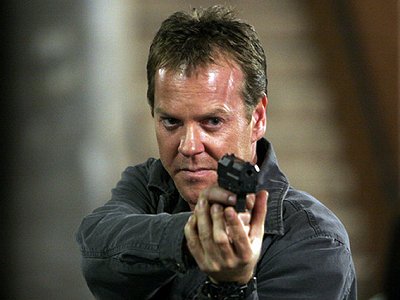
WHAT WOULD JACK DO?
24’s Jack Bauer has made torture by the good guys seem cool. The producers have a case to answer
TV’s The West Wing and 24 have supplied us with visions of U.S. government at its very best and its very worst. They have also given us compellingly good television, although it is hard to imagine either being developed in a British context, which is probably too cynical of government to broadcast The West Wing and not cynical enough to produce 24.
24’s dystopian world of imminent and catastrophic terrorist threats to U.S. national security (nuclear bombs, weaponised viruses and nerve agents) includes the routine resort to torture by federal agents (led by the indefatigable Jack Bauer) to obtain evidence which might save lives. I used, perhaps naively, to think that torture in real life was something the other guys did. Now, at the very least, it seems to be something others do on our behalf.
Most of us would rather not engage with this question. We feel an utter and unconditional abhorrence of a practice which goes against everything we believe in and stand for. At the same time we expect the security services to do everything within their power to prevent a catastrophic terrorist attack like 9/11 happening again.
Is there ever a point at which the latter consideration takes priority over the former? In his book, The Lesser Evil, liberal philosopher Michael Ignatieff posed this question and was promptly vilified by his peers for producing a torturer’s charter. Having read the book I think this criticism is unjustified. At least Ignatieff is prepared to engage with the question of what is expected of the State in its intelligence gathering when thousands of lives are potentially at stake.
The current, shadowy, practice of extraordinary rendition, where the U.S. exports suspects for questioning to countries which have fewer scruples over human rights, is the perfect solution for hypocrites: turn a blind eye while others sin in our interests. I expect some of the intelligence our security services use is gained by duress through the work of other national agencies. In the furore over extraordinary rendition, national newspapers alleged that one of the most common stopping off points in the journey for suspects from the West to North Africa or the Middle East is an airstrip in my own borough. The issue often comes closer to home than we imagine.
Inevitably some people will think I need to have more of the wisdom of the serpent and less of the innocence of a dove in addressing the long-established practices of intelligence gathering. As a Christian I believe I cannot justify torture under any circumstances, even though people already begin to surrender basic human rights (such as liberty) when they are suspected of criminal activity. Yet as the encounter with dangerous suspects withholding vital information affecting countless lives gets messier (something which happens by degrees), I find I haven’t got the rigour to think through complicated questions which are intellectually painful, and so I turn the blind eye. At least the pain is only intellectual for me. And all the while, as Christians engage with the question ‘What would Jesus do?’, in the spirit of 24 more people are beginning to ask themselves an altogether darker WWJD: what would Jack do?
POPULAR ARTICLES

Obama's Covert Wars
The use of drones is going to change warfare out of all recognition in the next decades.

Through A Glass Starkly
Images of traumatic incidents caught on mobile phone can be put to remarkable effect.

What Are British Values?
Is there a British identity and if so, what has shaped the values and institutions that form it?


